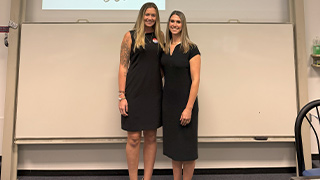
Leadership Fellows, Alyssa Dawson ’25 and Alison Opdyke ’25
The opportunity to be a part of the Leadership Fellows Program, under the direction of the incredible Professor Paula Franzese, has been an absolute honor and privilege. As we prepare to move on from Seton Hall Law, not only are we better leaders because of this program, but we are better people. The characteristics of effective leadership, the importance of empathy, and the power of gratitude are just a few of the things we have taken away from our time as Leadership Fellows, and we are forever grateful for this experience. As Prof. Franzese reminds us, “As lawyers we are uniquely able to use the law to be agents of change, champions of the underdog, and givers of hope.”
Our 2024 Leadership Fellows project was titled, “Arrest to Re-Entry: The Hidden Victims.” We began our project by identifying the failures of our country’s criminal justice system as it relates to the children of incarcerated parents. The trauma these children face begins at arrest and continues through the time of incarceration to re-entry. The effects on children are substantial – poor academic performance, psychological strain, antisocial behaviors, economic hardship, an increased risk of incarceration, disrupted family dynamics, and a pervasive social stigma. According to the Rand Corporation and Rutgers University NRCCFI, it is estimated that 10 million U.S. Children have experienced parental incarceration at some point in their lives. Currently, more than 2.7 million children have a parent who is incarcerated, with approximately half of those children being under 10 years old. The rates are significantly higher for Black and Hispanic children.
We identified the failed policies that exist in our system and potential solutions. There are opportunities to implement family-centered rehabilitation in jails and prisons, to improve visitation and communication policies, to equip schools with resources to support children, to reform re-entry policies for parents with a focus on their relationships with their children, and to raise public awareness with the goal of reducing the stigmas associated with incarceration. Specifically, in New Jersey, Senate bill 2526 would provide free telecommunication services for incarcerated persons at State, county, and private adult and juvenile correctional facilities. It is estimated that 1 in 3 families go into debt to afford communication with their incarcerated loved ones, and the majority of those carrying that burden are women. It is no surprise that children do better developmentally at school and at home when they are able to stay connected to their incarcerated parents. Legislation like S-2526 is a step in the right direction.
Further, we, aside from our extensive research, had the opportunity to sit down with a 19-year-old whose father is serving a 65-year prison sentence. Her story was eye-opening and heartbreaking. She spoke of the great difficulties and emotions tied to her father being incarcerated and the enormous impact it had on her childhood and her social relationships. She expressed her wish that there was more support for “kids like her.” She is not alone.
We were able to connect with various policy-based organizations who are working diligently in this space. Among them are Worth Rises, the Osborne Association, and the Returning Citizens Support Group of NJ. The work these organizations do is vital to reforming the current support system for incarcerated individuals and their families. We hope to continue to raise awareness of the work that is being done in this space upon graduating in May and wish to contribute to the transformative change that is so necessary for the hidden victims of our criminal justice system. There is no doubt that change takes time and dedication, and we have committed ourselves to a cause that so few consider, yet so many are affected by.
For more information, please contact:
Seton Hall Law School




